Formula for density - Study guides, Class notes & Summaries
Looking for the best study guides, study notes and summaries about Formula for density? On this page you'll find 2694 study documents about Formula for density.
Page 4 out of 2.694 results
Sort by
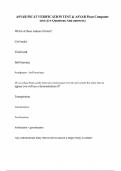
-
ASVAB PICAT VERIFICATION TEST & ASVAB Picat Computer Test (115 Questions And answers)
- Exam (elaborations) • 39 pages • 2024
- Available in package deal
-
- $10.00
- + learn more
Which of these reduces friction? Car breaks Tired tread Ball bearings Sandpaper - ball bearings If you place bean seeds between moist paper towels and watch the stem leaves appear you will see a demonstration of? Transpiration Germination Fertilization Pollination - germination Any astronomical body that revolves around a larger body is called? A nova A comet A satellite An asteroid A meteoroid - satellite In chemistry, to be classified as an organic substance, a substance must c...
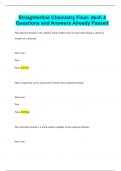
-
Straighterline Chemistry Final- deck 4 Questions and Answers Already Passed
- Exam (elaborations) • 19 pages • 2024
- Available in package deal
-
- $9.99
- + learn more
Straighterline Chemistry Final- deck 4 Questions and Answers Already Passed The empirical formula is the simplest whole number ratio of atoms representing a chemical formula of a molecule. Select one: True False True Many compounds can be represented with the same empirical formula. Select one: True False False The molecular formula is a whole number multiple of the empirical formula. Select one: True False True There is only one distinct empirical formul...
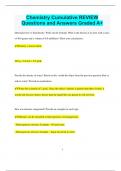
-
Chemistry Cumulative REVIEW Questions and Answers Graded A+
- Exam (elaborations) • 16 pages • 2024
- Available in package deal
-
- $9.99
- + learn more
Chemistry Cumulative REVIEW Questions and Answers Graded A+ Determine how to find density. Write out the formula. What is the density of an item with a mass of 40.0 grams and a volume of 8.0 milliliters? Show your calculations. Density = mass/volume 40.0 g ÷ 8.0 mL = 5.0 g/mL Provide the density of water? Based on this, would the object from the previous question float or sink in water? Provide an explanation. Water has a density of 1 g/mL. Since the object’s density is greater ...
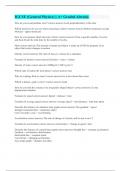
-
IGCSE (General Physics) || A+ Graded Already.
- Exam (elaborations) • 8 pages • 2024
- Available in package deal
-
- $10.89
- + learn more
How do you avoid parallax error? correct answers Look perpendicularly at the ruler Which meniscus do you use when measuring volume? correct answers Bottom meniscus (except Mercury - upper meniscus) How do you measure short intervals of time? correct answers Time a specific number of cycles and then divide the total time by the number of cycles. Mass correct answers The amount of matter and object is made up of OR the property of an object that resists changes in motion Density correc...

-
Portage Learning / CHEM 104 / Module 1 to 6 Exams
- Exam (elaborations) • 34 pages • 2022
-
- $14.49
- 1x sold
- + learn more
Portage Learning / CHEM 104 / Module 1 to 6 Exams . MODULE 1 EXAM Question 1 Convert 845.3 to exponential form and explain your answer. 1. Convert 3.21 x 10-5 to ordinary form and explain your answer. 1. Convert 845.3 = larger than 1 = positive exponent, move decimal 2 places = 8.453 x 102 2. Convert 3.21 x 10-5 = negative exponent = smaller than 1, move decimal 5 places = 0. Question 2 Using the following information, do the conversions shown below, showing all work:...

-
Animal Diversity 8th Edition By Hickman - Test Bank
- Exam (elaborations) • 363 pages • 2023
-
- $22.81
- 1x sold
- + learn more
Animal Diversity, 8e (Hickman) Chapter 1 Science of Zoology and Evolution of Animal Diversity 1) A characteristic of science is that A) it is not explained by natural laws. B) its hypotheses are testable. C) its conclusions are final. D) it is not falsifiable. E) it seeks to define the vitalistic forces of life. Answer: B Section: 01.01 Topic: Principles of Science Learning Objective: 01.01 Explain that science consists in testing, possibly rejecting, and improving our simplest and be...
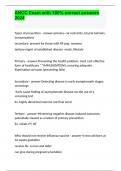
-
ANCC Exam with 100% correct answers 2024
- Exam (elaborations) • 131 pages • 2024
- Available in package deal
-
- $7.99
- 1x sold
- + learn more
Types of prevention - answer-primary- car restraints, bicycle helmets, immunizations secondary- prevent for those with RF-pap, mammo tertiary-mgmt of established disease- meds, lifestyle Primary - answer-Preventing the health problem, most cost effective form of healthcare **IMMUNIZATIONS, ensuring adequate illumination at home (preventing falls) Secondary - answer-Detecting disease in early asymptomatic stages, screenings -Early cause finding of asymptomatic disease via the use of a sc...
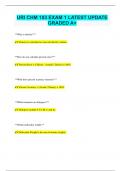
-
URI CHM 103 EXAM 1 LATEST UPDATE GRADED A+
- Exam (elaborations) • 11 pages • 2024
- Available in package deal
-
- $9.99
- + learn more
URI CHM 103 EXAM 1 LATEST UPDATE GRADED A+ **What is density?** Density is calculated as mass divided by volume. **How do you calculate percent error?** Percent Error = ((Theory - Actual) / Theory) × 100% **What does percent accuracy measure?** Percent Accuracy = (Actual / Theory) × 100% **Which elements are halogens?** Halogens include F, Cl, Br, I, and At. **Define molecular weight.** Molecular Weight is the sum of atomic weights. **What is the formula for calculating atomic...
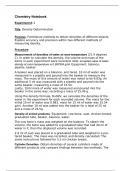
-
CHEM 121 Lab 2 Density Determination (Portage learning)
- Other • 7 pages • 2024
-
- $21.49
- + learn more
Title: Density Determination Purpose: Familiarize methods to obtain densities of different objects. Explore accuracy and precision within two different methods of measuring density. Procedure: Measurement of densities of water at room temperature (21.4 degrees C). In order to calculate the density, the volume and mass of the items in each experiment were recorded. Note: accepted value of water density at room temperature is 0.997904 g/ml. Equipment: balance, pipette, beaker. A beaker was...
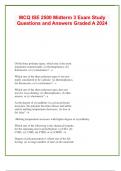
-
MCQ ISE 2500 Midterm 3 Exam Study Questions and Answers Graded A 2024
- Exam (elaborations) • 17 pages • 2024
-
- $13.49
- + learn more
Of the three polymer types, which one is the most important commercially: (a) thermoplastics, (b) thermosets, or (c) elastomers? - a Which one of the three polymer types is not nor- mally considered to be a plastic: (a) thermoplastics, (b) thermosets, or (c) elastomers? - c Which one of the three polymer types does not involve cross-linking: (a) thermoplastics, (b) ther- mosets, or (c) elastomers? - a As the degree of crystallinity in a given polymer increases, the polymer become...

That summary you just bought made someone very happy. Also get paid weekly? Sell your study resources on Stuvia! Discover all about earning on Stuvia


